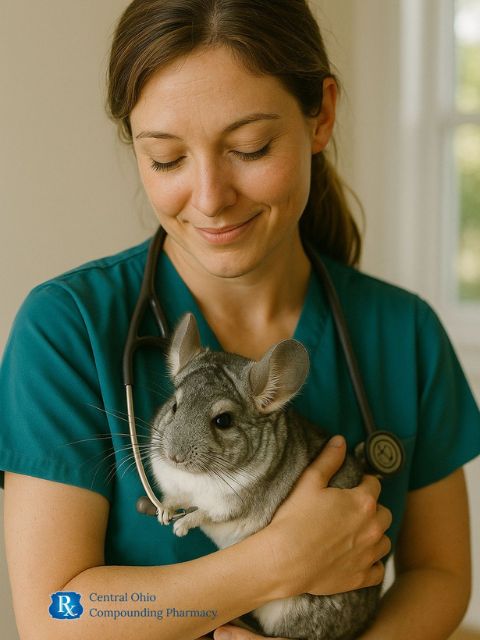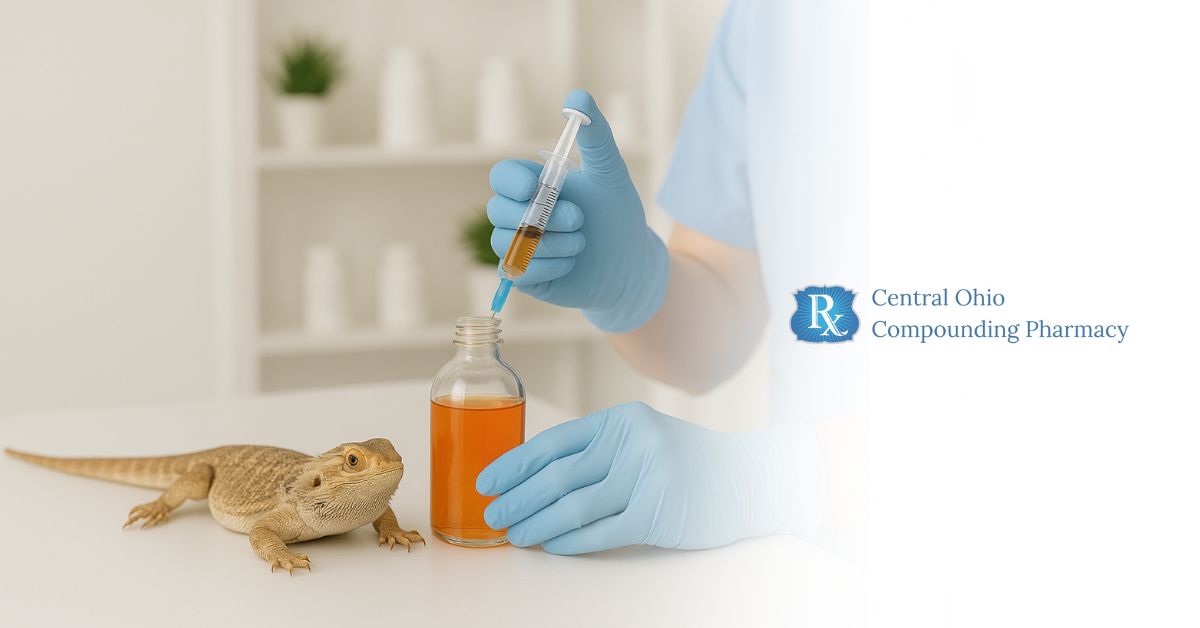Custom Compounding for Exotic Pets: Suspendit Anhydrous Formulas in Central Ohio
When it comes to the health of exotic animals — parrots, reptiles, rabbits, ferrets, and more — standard veterinary medications are often insufficient. These animals have unique metabolic rates, sensitivities, and medication needs that differ significantly from those of cats and dogs. This makes individualized medications not only helpful but often essential.
That’s where veterinary compounding, especially using Suspendit Anhydrous formulas, becomes a vital tool for veterinarians and exotic pet owners alike.
What is Suspendit Anhydrous?
Suspendit Anhydrous is a specialized non-aqueous suspension base designed for pediatric use and, more commonly, veterinary use. Unlike water-based suspensions, Suspendit Anhydrous provides stability for medications that degrade quickly when exposed to moisture. Free of sugar, gluten, and casein, it features a smooth, palatable texture and thixotropic behavior — meaning it becomes less viscous when shaken but remains stable when stored.
These features make it particularly well-suited for exotic species that require highly specific formulations, dosages, and flavors that standard medications cannot accommodate.
“Suspendit Anhydrous vehicle is designed to be self-emulsifying… to exhibit thixotropic behavior for easy redispersion and to offer improved palatability.”
Source: Pharmaceutics
Why Exotic Animals Need Compounded Medications
Many commercially available drugs are not made with exotic animals in mind. These animals often fall below the weight thresholds for standard dosing, or they reject medications due to taste or texture.
Veterinary literature has long supported the use of compounding for exotic species. A review in Veterinary Clinics of North America: Exotic Animal Practice noted that compounded medications improve therapy success by offering dosing flexibility and better palatability for birds, reptiles, and small mammals. Peer-reviewed research also shows that compounded medications are critical when FDA-approved veterinary drugs are unavailable or unsuitable for a specific species.

“Many exotic pets cannot take pills, and often, commercially available drugs are formulated in concentrations inappropriate for small exotic patients.”
Source: Exotics
Suspendit Anhydrous Suspensions: Common Species and Use Cases
Compounding pharmacies regularly compound Suspendit Anhydrous suspensions for a wide range of exotic animals, including:
- Birds: parrots, cockatiels, finches
- Reptiles: turtles, lizards, snakes
- Small mammals: rabbits, ferrets, chinchillas, hedgehogs
- Amphibians and fish: in cases requiring precise, preservative-free medication
Veterinarians in zoological care, wildlife rescue, and avian or exotic small animal practice use Suspendit-based suspensions to address issues ranging from infections to chronic conditions like cardiovascular disease and pain management.

Detailed Examples of Prescribing Situations
1. Respiratory Infection in a Parrot
A parrot diagnosed with a respiratory infection is prescribed ciprofloxacin. Standard tablets are far too large and unpalatable for the bird. Compounding the antibiotic in a chicken- or banana-flavored Suspendit Anhydrous base allows accurate dosing and better acceptance.
2. Heart Medication for a Bearded Dragon
A small bearded dragon develops signs of heart failure and is prescribed enalapril. The commercially available forms are not only too strong but also contain preservatives unsuitable for reptiles. Compounding enalapril in Suspendit at a precise mg/mL concentration ensures the drug remains stable over weeks and palatable for repeated administration.

3. Pain Management for a Chinchilla
A geriatric chinchilla with arthritis requires gabapentin. The owner struggles with giving tablets, and compounded liquid formulations from commercial pharmacies have too short of a shelf life. A Suspendit-based gabapentin suspension offers accurate low-dose delivery in a tasty format with extended stability.
4. Behavioral Medication in Ferrets
Ferrets experiencing anxiety or aggression may require medications like haloperidol or fluoxetine. These are not available in doses appropriate for ferrets. A Suspendit compound offers customization of both dose and flavor, making the medication easier to administer regularly.
5. Gastrointestinal Issues in Turtles
Turtles with delayed gastric emptying benefit from compounded cisapride, which is unstable in water-based suspensions. Suspendit allows for long-term storage of this medication while keeping it safe and effective for administration in very small amounts.
Why Veterinarians Prefer Suspendit Anhydrous
Suspendit Anhydrous has several potential advantages in clinical veterinary settings:
- Extended stability: Many formulations are viable for up to 180 days when compounded and stored appropriately.
- Customized dosing: Medications can be compounded to suit exact weight-based doses for animals weighing only grams.
- Improved palatability: Chicken, fish, fruit, and vanilla flavors can be added to improve acceptance in picky or sensitive animals.
- Enhanced accuracy: The formulation remains homogenous after shaking, ensuring consistent dosing even in suspensions stored over time.
The most frequently compounded medications for exotic animals at Central Ohio Compounding Pharmacy include:
- Cisapride – Commonly compounded for gastrointestinal motility issues in species like rabbits, guinea pigs, and reptiles.
- Enrofloxacin – A broad-spectrum antibiotic used for various infections in birds, reptiles, and small mammals.
- Gabapentin – Prescribed for pain management or neurologic conditions in ferrets, sugar gliders, and parrots.
- Furosemide – A diuretic used to manage fluid retention in exotic species, such as hedgehogs and reptiles.
- Chloramphenicol – An antibiotic suitable for birds and reptiles when other medications are ineffective or not tolerated.
- Pimobendan – Used for cardiac conditions in species like rabbits and ferrets.
- Haloperidol – Sometimes used to treat behavioral or neurologic disorders, especially in avian medicine.
- Maropitant – Effective as an anti-nausea agent for species prone to vomiting or motion sickness (e.g., reptiles and small mammals).
- Isoxsuprine – A vasodilator used in species experiencing circulation issues, sometimes seen in reptiles and small mammals.
- Prednisolone – For inflammatory or autoimmune conditions across a wide range of exotic species.
- Atenolol – A beta-blocker used in some exotic pets for cardiac management.
- Vitamin A Palmitate – Often used for reptiles or amphibians with dietary deficiencies.
These formulations are compounded in a palatable and stable suspension (Suspendit Anhydrous), ideal for exotic species sensitive to water-based formulations or with specific dietary restrictions.
Regulatory and Clinical Considerations

Extralabel drug use is common and often necessary in exotic veterinary medicine. The FDA recognizes this practice under the Animal Medicinal Drug Use Clarification Act (AMDUCA), provided a valid veterinary-client-patient relationship (VCPR) exists.
Veterinarians must always ensure that compounded medications are appropriate for the species and condition and that the compounding pharmacy adheres to USP standards and state regulations.
At Central Ohio Compounding Pharmacy, all formulations are prepared by trained staff using electronic mortar and pestle mixing for content uniformity.
A Trusted Resource in Central Ohio
Central Ohio Compounding Pharmacy is dedicated to supporting veterinarians and exotic pet owners with advanced compounding services. Our team works directly with providers to ensure precise formulations that meet the unique needs of each species.
Whether it’s flavor masking, low-dose suspensions, or medication that requires a moisture-free environment, Suspendit Anhydrous formulas offer a flexible, customized approach to pet medication.
For providers and pet owners alike, our goal is to make medicine easier and potentially safer to use.
Interested in more helpful tips for animal wellness & medications?
Follow us on social media, and stay tuned for Fur Baby Fridays — where we explore different topics related to animal health and wellness.
References:
- Banov, D., Liu, Y., Ip, K., Shan, A., Vu, C., Zdoryk, O., Bassani, A. S., & Carvalho, M. (2023). Analysis of the physical characteristics of an anhydrous vehicle for compounded pediatric oral liquids. Pharmaceutics, 15(11), 2642. Link
- Fields, S. W. (2006). Compounding for veterinary medicine. International Journal of Pharmaceutical Compounding, 10(6), 417. Link
- Graves, R. A., Mandal, T. K., Bostanian, L. A., Nguyen, A. T. Q., Swopes, D., Morris, T. C., & Pramar, Y. V. (2019). Physicochemical stability of compounded amlodipine besylate suspensions in PCCA base, SuspendIt. International Journal of Pharmaceutical Compounding, 23(6), 519–527. Link
- Hess, L. (2006). Compounding drugs for exotic species. Exotics. Link
- Lust, E. (2004). Compounding for animal patients: contemporary issues. Journal of the American Pharmacists Association, 44(3), 375-386. Link
- Powers, L. V., & Davidson, G. (2018). Compounding and Extralabel use of drugs in exotic animal medicine. Veterinary Clinics: Exotic Animal Practice, 21(2), 195-214. Link
- Pramar, Y. V., Mandal, T. K., Bostanian, L. A., Kader, C., Morris, T. C., & Graves, R. A. (2021). Physicochemical and microbiological stability of extemporaneously compounded hydrocortisone oral suspensions in PCCA base, SuspendIt. International Journal of Pharmaceutical Compounding, 25(5), 431–439. Link
- Pramar, Y. V., Mandal, T. K., Bostanian, L. A., Le Giang, M., Morris, T. C., & Graves, R. A. (2021). Physicochemical and microbiological stability of compounded metronidazole suspensions in PCCA SuspendIt. International Journal of Pharmaceutical Compounding, 25(3), 169–175. Link

